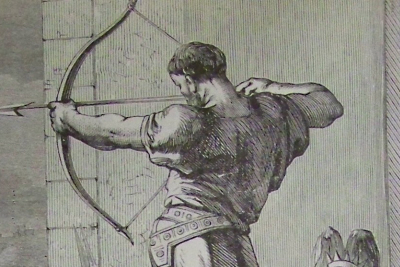
Striking Syria
The story of Joash, Elisha, and the arrow of the LORD’s deliverance is confusing. Why would God withhold blessing from someone who obeys? This obscure story may not make sense at first, but it reveals the character of true obedience to God.
One of the most confusing Bible stories for me is the story of Joash, Elisha, and the arrow of the LORD’s deliverance. In this story, God seems capricious and random. God seems to punish an individual because he doesn’t obey properly – even though he had never been told how to obey!
Summary
Here’s a brief recap of the story, found in 2 Kings 13:14-19. Elisha, the famous man of God, is going to die. Joash, the king of Israel, comes to see the prophet and weeps over him. Even though Joash is a wicked man, he honors and respects the prophet, knowing that Elisha has blessed the kingdom of Israel.
Elisha recognizes that it is time to give Joash some good news. Since the Kingdom of Israel has been involved in a chronic war with the Kingdom of Syria, Elisha uses an arrow as an illustration. He commands the king to shoot the arrow out the window toward the east. When the king obeys, Elisha tells him that the arrow symbolizes Jehovah’s deliverance from Syria. So far, all is well. Joash is encouraged that his Kingdom will win the war.
What comes next is mystifying. The prophet commands the king to pick up several arrows. The king does so. Elisha commands, “Strike the ground.” Again, the king obeys, hitting the ground three times with the arrows in his hand. But Elisha is angry. “You should have struck five or six times,” he rebukes the king. “Then you would have struck Syria till you had destroyed it! But now you will strike Syria only three times!”
Striking Hard
You probably recognize the randomness of this whole scenario. God never told Joash how many times to strike the ground. The king did what he was told…and found out that he was not obedient to what God actually wanted from him. How do we even make sense of such a story?
Talking with a friend about this narrative, he gave me a good perspective that I had never considered. “If God tells me to strike,” he said, “I’m going to strike!”
Joash may not have understood what the prophecy entailed, but he did know one thing. God wanted him to strike. Knowing that, he should strike like his life depends on it. Hit the ground hard, king of Israel! Do it repeatedly! The God of Israel has commanded it!
In the end, Joash did obey. He struck the ground. And because of that, he was promised that he would receive three victories over Syria. It is not that he was punished, but that God’s blessing was withheld from him. If he had been wholehearted in obedience to God’s revealed will, he could have received more blessings.
Doing All for God
I may not understand why God has given me certain tasks and responsibilities, but I know they come from Him. Because they come from Him, I need to devote myself to these things wholeheartedly. Even if I am told to hit the ground with arrows, I should do it for the glory of God, as Paul commands in 1 Corinthians 10:31. With this perspective, I’m sure Joash would have hit the ground more than three times.
Solomon says the same thing in Ecclesiastes 9:10 – “Whatever your hand finds to do, do it with your might.” Even if that means hitting the ground with arrows? Yes. It might be the arrow of Jehovah’s deliverance.
What other lessons can you find in this story?
Does this story point out any aspects of your life that you need to do wholeheartedly, for God’s glory?
If you enjoyed this post, please consider sharing it with others using the share buttons below! Plus, you’ll receive a free copy of ‘Essential Democracy!’




I thought of prayer when reading this. I thought of the fact that His blessing is greater or lesser depending on how we pray and seek His face. If I am earnestly seeking to prevail upon Him then He might do something, but if I am not even trying then He might not do anything. It’s interesting that He seems to leave a lot in our hands in things like this so we have no excuse to just sit back and “leave it God” or lazily say, “it’s God’s will.”
Scott, true point you make. I’m sure that if Joash was earnestly seeking God’s face, this story would be different. It is far too easy for us to sit back content with ‘God’s will.’ I remember that just before the Red Sea was parted, Moses cried out to God, and God said – in essence – ‘Why are you just standing there? Get moving!’
I think you came out right on this one. You might want to check out a sermon by Jeremy Walker on sermonaudio called The Way Forward. This is a 3 part sermon on this text. Dave Valkus
Good comment Scott.
Very good post. 🙂
Scott, David, and Raechel, thanks for the encouragement. God certainly taught me a valuable lesson from this story!
Since you Asked, here’s another lesson I found:
Joash wasn’t exclusively devout; he had continued the worship of calves alongside the worship of Jehovah in Israel, and yet he respected Israel’s history enough to greet Elisha with a reference to the chariot and horses of fire. This imagery had shown up in Elisha’s life twice before when the Kingdom of Heaven was visible as active/interactive with Earth-events. At some level, Joash knew he was at the intersection of these two realms.
I think many get hung up on “He was never told how to obey!” The ‘other lesson’ is about the importance of relationship. Joash knew enough to obey the prophet, but he did not get the full understanding that a close relationship with the Lord would have given him. He was confused on how to obey God because of lack of personal knowledge of God. Three times seemed good to his human reasoning.
And now, in 2020, four years after the blog post, a time with a pandemic and chaotic politics, the modern church seems to have followed Josah’s partial compliance. It has been faithful to the level of earth-based knowledge, but it stopped short of a fiery relationship that allows Heaven to show up.